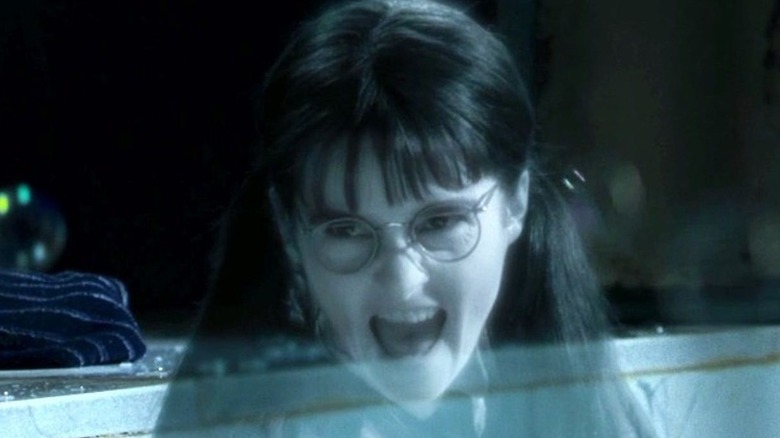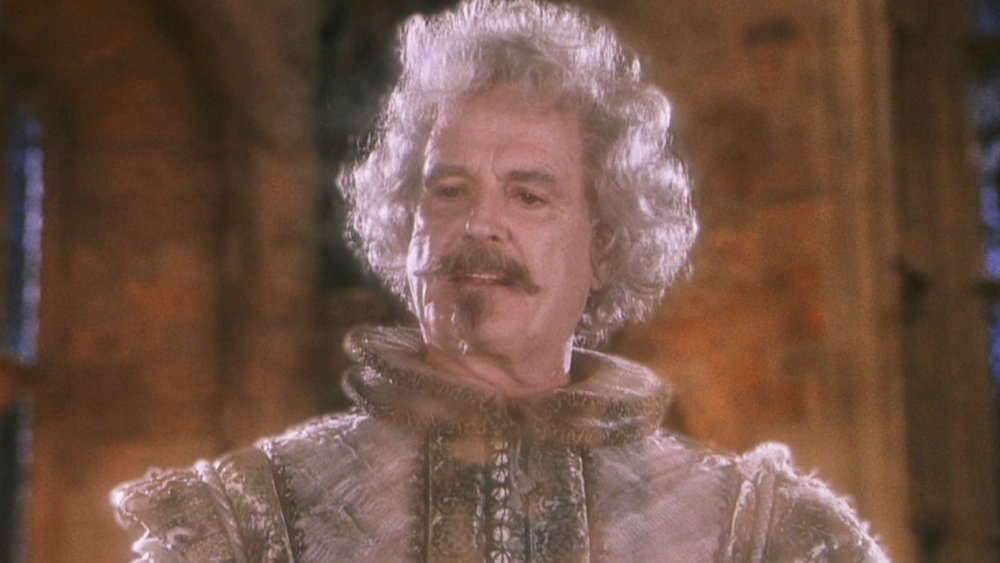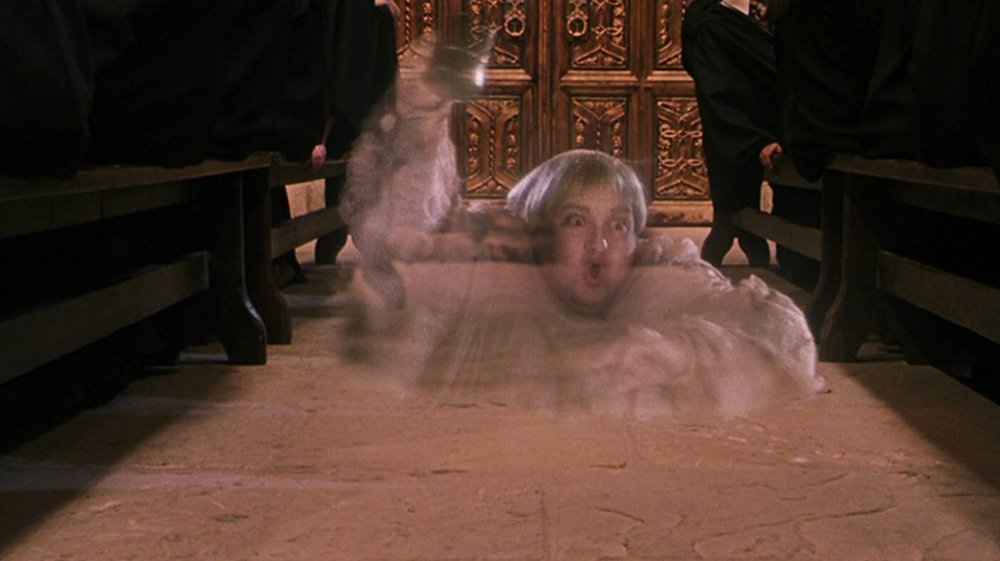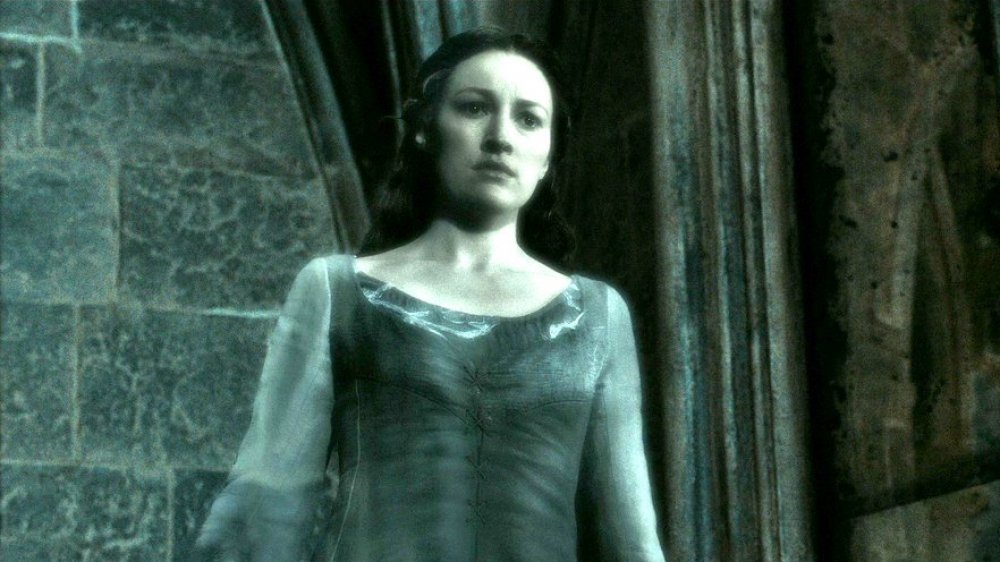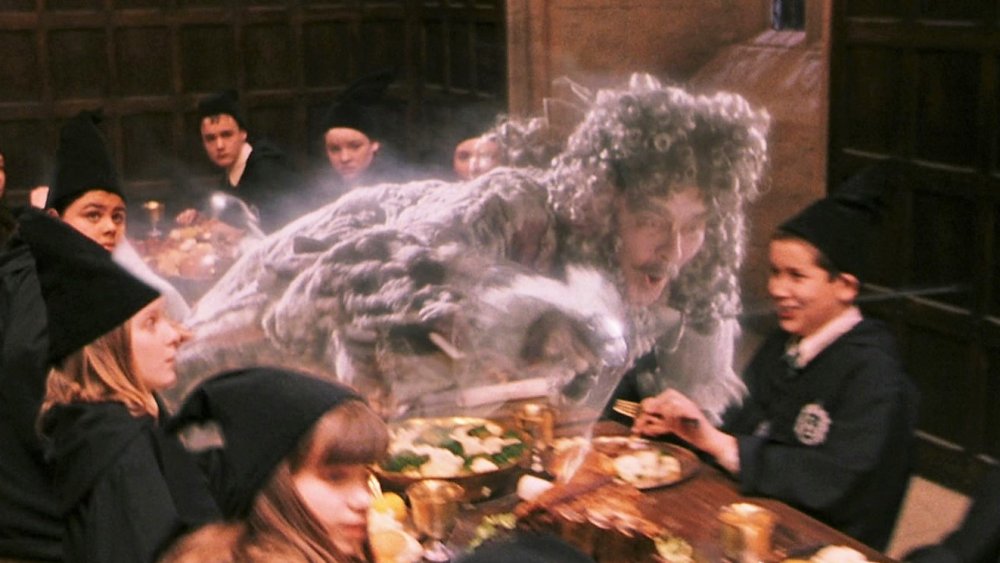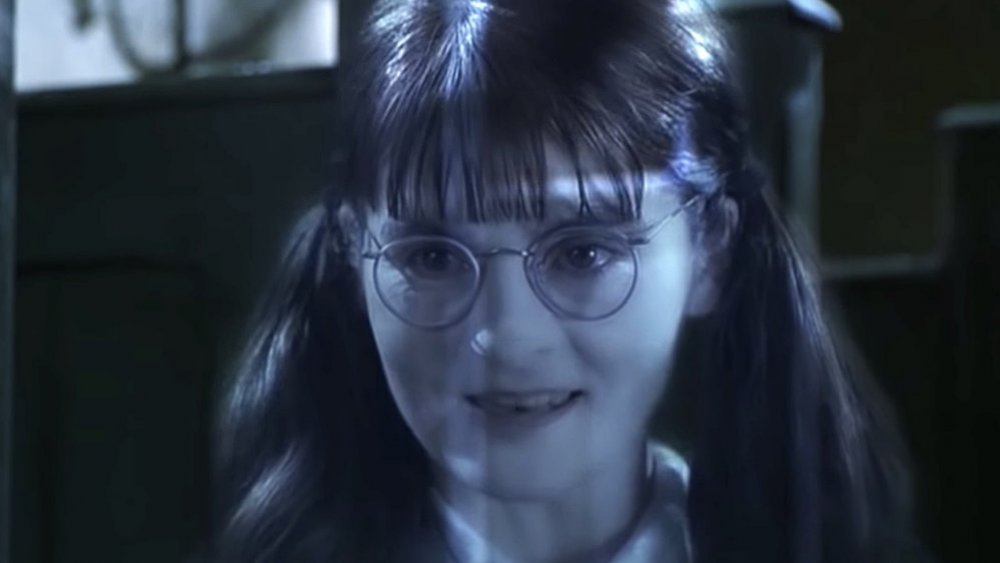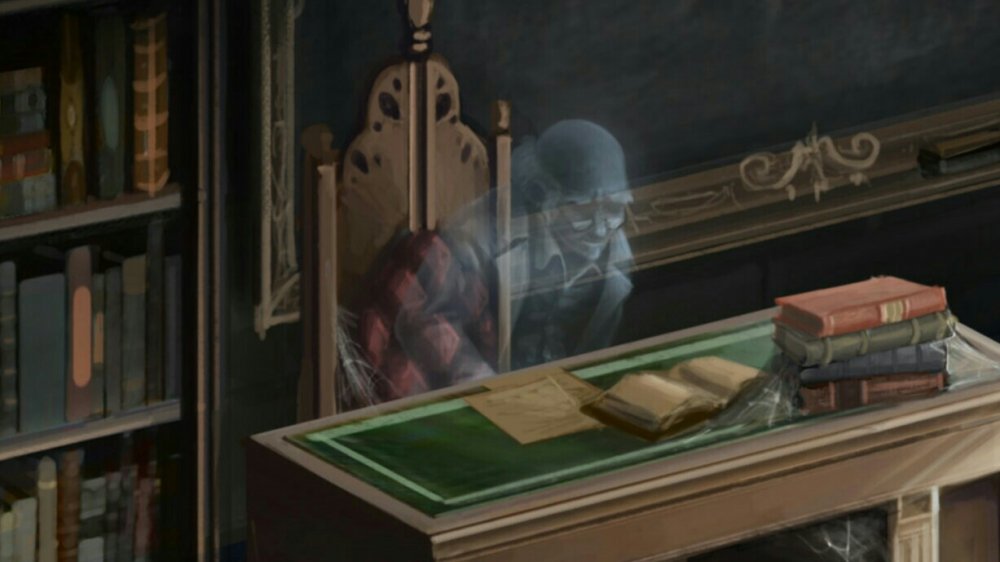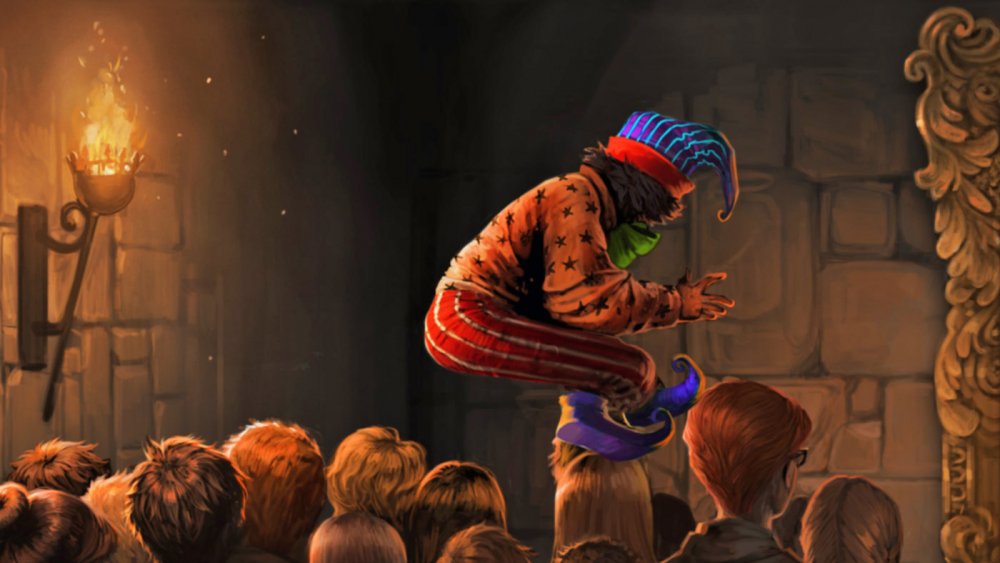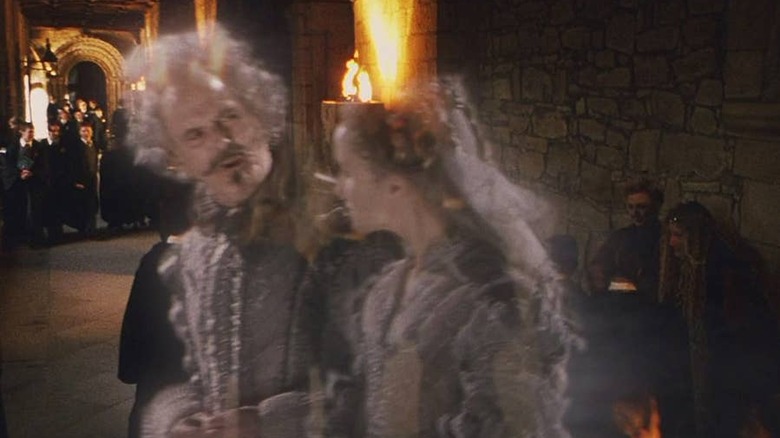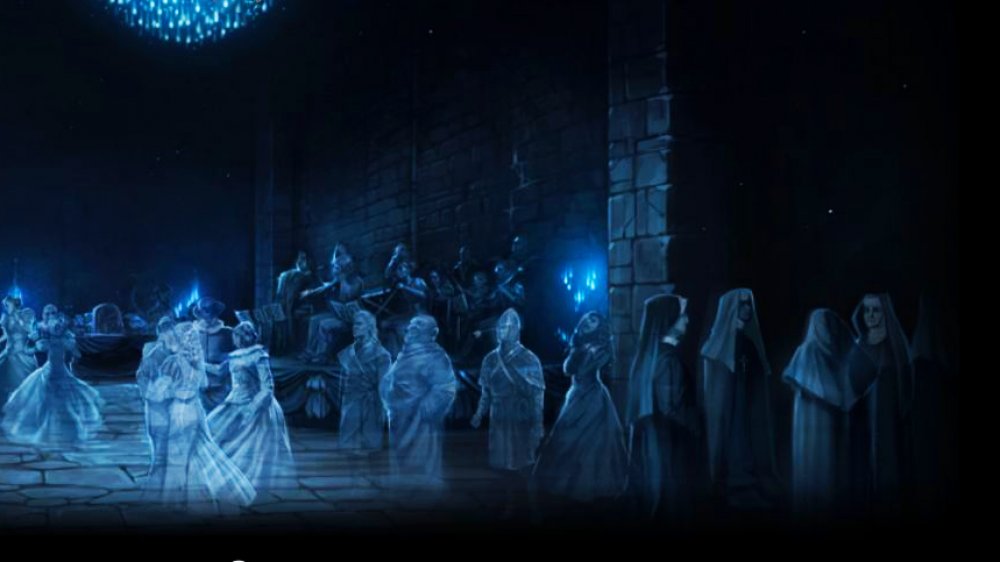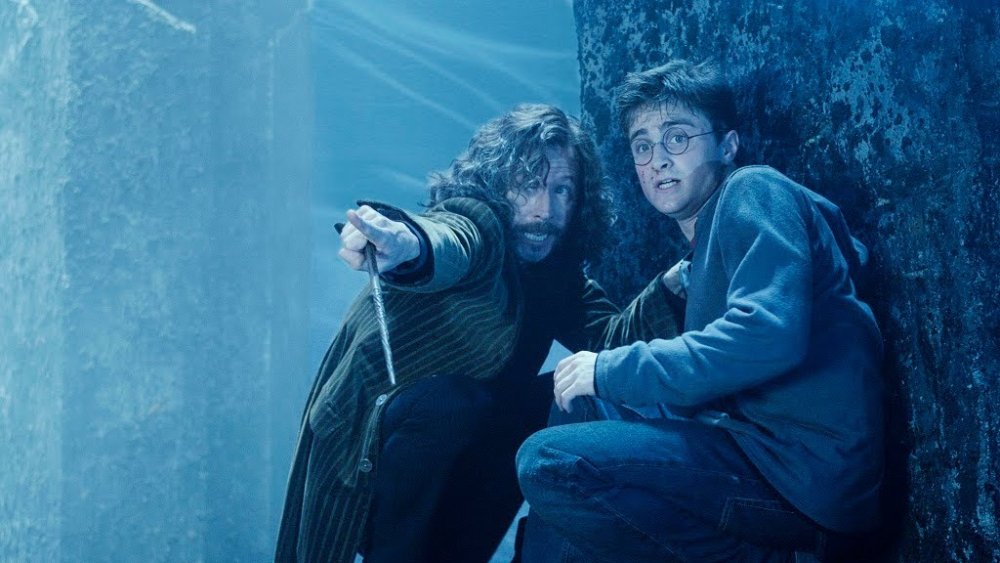Every Ghost In Harry Potter Explained
Typically, school mascots are stylized cartoon characters, represented by students who jump around in oversized costumes. But things work a little differently at Hogwarts. The venerated school of magic prefers to represent its students with ghosts — and we're not talking cuddly Casper types, here. If you found watching Lavender Brown and Ron make eyes at each other unbearable, get ready for the deadly drama between the Grey Lady and the Bloody Baron. And the intrigue doesn't stop there. Sure, Hogwarts students' theatrics may reach epic proportions, but no one cries in the bathroom more than Moaning Myrtle. Her tragic backstory is almost enough to make people feel bad for her — until she starts harassing every boy who dares enter the Prefects' bathroom. And don't even get us started on the ghosts with jobs at Hogwarts — death, it seems, is not enough to keep some professors from a paycheck.
From the House ghosts to the pestering poltergeists, this is everything you need to know about the gaunt ghosts who haunt the Harry Potter series.
Nearly Headless Nick
Sir Nicholas de Mimsy-Porpington, known in his afterlife as Nearly Headless Nick, is more than happy to terrify young Gryffindors with a look at his poorly severed neck. The outspoken ghost attended Hogwarts a mere five centuries after the school's founding, making him the oldest (un)living Gryffindor. It's only fitting that he returned to his old haunt (pun very much intended) after his 1492 death. As the Gryffindor ghost, he is a passionate, if pompous representative of house ideals.
The nobleman lead an exciting life after his Hogwarts days, becoming knighted and part of the royal court of Henry VII. Unfortunately, his wandsmanship was inferior to his swordsmanship. In an attempt to woo a lady-in-waiting, Sir Nick botched a spell meant to fix her teeth, giving her tusks instead. He got 45 excruciating whacks to the neck with a dull ax for his troubles. The 15th-century wasn't a prime time to show off magic to muggles, given witch-hunting — he really should have known better. But then again, Gryffindors aren't usually ones to turn down a chance to look cool.
While the axing took his life, it didn't fully take his head, which remains attached to his neck by a small strip of sinew. This lead to his tragic rejection from the Headless Hunt, a group of decapitated ghosts who play head games ... literally. Not even a thumbs up from the Harry Potter could secure Nick a place in the group.
The Fat Friar
The Fat Friar is the Hufflepuff house ghost. While not much is known about the portly specter's origins, we do know that he was born in the 10th century, around the same time Hogwarts was founded. As is a requirement of all house ghosts, he attended the school as a member of the house he would later represent. As his name implies, he went on to a life of religious fealty. As a friar of his particular era, he likely lived a humble life, sustained through the charity of others.
The Fat Friar was specifically known for his kindness: He became renowned for being able to cure sickness by "poking" sufferers with what appeared to be a mysterious sick. Moreover, he developed a habit of entertaining others by pulling bunnies out of communion cups. Senior clergy became suspicious, and in the end, the Fat Friar was executed. A tragic end for a kindly man, but hey — at least he gets to hang out with Hufflepuffs for the rest of his undead days.
The Grey Lady
Ravenclaw's ghost, the Grey Lady, boasts an even more tragic backstory than Moaning Myrtle. As the daughter of Hogwarts founder Rowena Ravenclaw herself, Helena Ravenclaw lived in her brilliant mother's shadow. Suffocated by the expectations foisted upon her, Helena stole Rowena's diadem, said to have intelligence-enhancing abilities, and fled Scotland forever.
Ashamed, Rowena hid her daughter's transgressions and never revealed she'd lost her precious diadem. Upon falling fatally ill, however, Rowena enlisted the help of the shadowy Baron, a man her daughter had spurned for years, in attempt to make deathbed amends. The Baron did indeed find Helena abroad — but she refused to return to Scotland with him. Enraged, he stabbed and killed her in the Albanian forest that Voldemort would later haunt in his bodiless form. She returned to Hogwarts as a ghost, condemned to haunt its halls forever as the mysterious Grey Lady.
While at Hogwarts, Tom Riddle managed to coax the diadem's hiding place out of Helena. He turned the relic into a horcrux, and hid it in the Room of Requirement. Poor Helena — she can't get a break from awful dudes, even in the afterlife.
The Bloody Baron
The Bloody Baron is basically the guy who flips out after a girl he DMs doesn't immediately fall for him. This guy not only killed Helena Ravenclaw when she refused his advances, he followed her to Hogwarts post-mortem, forcing her to endure her afterlife alongside her killer. The only satisfaction he gives her, as Helena relays to Harry in Deathly Hallows, is wearing eternal chains in penitence.
As the Baron took his own life after realizing the depths of his cruelty, it's a bit strange that he came back as a ghost. His actions seem like an attempt to punish himself for killing the woman he "loved" ... but sulking around the castle in clothes still drenched with her blood doesn't exactly scream "repentance." Sure, he wears chains, but he can't, yknow, haunt literally any place besides the one she occupies?
While Helena's story (and subsequent murder) is fascinating enough to warrant a companion novel, the Grey Lady's identity and the Bloody Baron's secret are all but unknown to most Hogwarts students. When Harry searches for answers about the missing diadem, few can provide him with answers — not even Professor Flitwick, the Ravenclaw head of house, knows about its sordid history. Students speculate about the Baron's dark deeds, but his gloomy disposition and bloody clothes make him formidable enough to keep even Peeves (mostly) in line. Congratulations, Baron. You're good for something.
Moaning Myrtle
Moaning Myrtle might be annoying, but she's got a pretty good reason. Once a young Hogwarts student of the 1940s, Myrtle Warren was mercilessly picked on by her classmate, Olive Hornby. One day, as she cried in the bathroom, Myrtle heard a strange noise. She looked up — and died. Tom Riddle, then a Hogwarts student as well, had released the basilisk from the Chamber of Secrets, and Myrtle was the first victim of its deadly gaze.
To call Myrtle a vengeful spirit doesn't even begin to cover it. Haunting Olive Hornby is the reason Myrtle became a ghost at all, and boy, did she throw herself into it. Myrtle haunted Olive so relentlessly that, following Myrtle's disruption of a Hornby family wedding, Olive took the issue to the Ministry of Magic. The Ministry ordered Myrtle to haunt the toilets of her place of death for the rest of her afterlife.
Myrtle's only solace is eavesdropping on other girls and creeping on Hogwarts boys. Sure, Myrtle is occasionally seen helping Harry and comforting a lonely Draco Malfoy ... but she's also spied on them in the luxurious confines of the Prefects' special bathroom. Sure, it stinks to be stuck permanently at 14, but that's really no excuse.
Professor Binns
Ask any Hogwarts student who the most boring professor is, and they'll name Professor Cuthbert Binns. He's also a ghost. That's right: Binns is so boring, he manages to make "undead teacher" into a dull affair.
Some say the ghostly professor never even realized he died. Binns perished while napping in the staff room, woke up, and floated right through the blackboard to teach his next class. Imagine the dullest teacher in your school getting tenure for eternity. Admittedly, it'd be pretty tragic to fire an elderly spirit ... but that means generations of Hogwarts students are condemned to the worst possible History of Magic lessons.
Despite his snore-inducing style, Binns does get a chance to shine in Chamber of Secrets. While McGonagall explains the mysteries of the Chamber to Harry's class in the movie, Binns dishes the dirty details in the book. Though Binns knows the legend well, he denies the existence of the Chamber entirely, calling it a myth. Having taught Harry's parents and Harry himself, it's likely the ghostly professor kept his position after the Battle of Hogwarts. Yet he still can't remember anyone's name correctly.
Peeves
Peeves is the most uncontrollable force at Hogwarts. He isn't technically a ghost, but a poltergeist — spirits who, in the Harry Potter universe, are born from environments of intense emotion. It's no surprise, then, that a school full of adolescents spawned Peeves: He's been part of Hogwarts for as long as the school has existed.
Peeves has a thousand-year tradition of infuriating Hogwarts caretakers. While the poltergeist isn't exactly malicious, his chaotic nature causes him to prank students and staff alike. Peeves causes all manner of mischief, from singing goofy rhymes about moldy Voldy to stuffing keyholes full of gum. He's drawn to like-minded students like Fred and George Weasley, who he seems to genuinely respect — but all others should watch out. Peeves does fear the Bloody Baron, who is the only entity able to keep the unruly poltergeist in line, aside from Albus Dumbledore.
In 1876, Hogwarts caretaker Rancorous Carpe tried to trap the menace in a bell jar. Peeves quickly broke through, and proceeded to take control of the castle for three days. Eventually, then-Headmistress Eupraxia Mole signed a contract with Peeves, ensuring him a weekly swim in the boy's toilet, a colorful custom-made hat, and access to stale bread, in exchange for peace. Peeves isn't without his loyalty, though. He fought in the Battle of Hogwarts to protect the school.
The ghosts that never were
Ghosts might be thick on the ground of the wizarding world, but there were plans for many more who never made it into the books or movies. While some of these figures were never more than unnamed wisps of ideas, others were extensively detailed, and even made it into early drafts of Sorcerer's Stone.
One planned ghost, called the Toad, sounds like he belongs in Ghostbusters. A deceased toad, he was going to leave behind ectoplasm wherever he hopped. Then there's Edmund Grubb, who J.K. Rowling says she "rather [regrets] not using." As her notes detail, the evocatively named Grubb perished in the doorway of the Great Hall after consuming poisonous berries. Occasionally, out of spite, Grubb would have refused students entry into the Hall. Rowling also mentions a ghost known as the Black Knight, but never elaborates further than the name. Some descriptions of omitted ghosts did end up in the books, however, as vaguely described figures at Nearly Headless Nick's deathday party.
A deathday party
In the world of the undead, the anniversary of one's death is a cause for celebration. Harry, owing Nick for getting him out of trouble, gives up Halloween treats in Chamber of Secrets to kick it at Nearly Headless Nick's deathday party. Flanked by Ron and Hermione, Harry talks up the Gryffindor ghost to the head of the Headless Hunt, an exclusive club for decapitated ghosts Nick desperately wants to join. But to play Hunt games like "Head Hockey," Nearly Headless Nick would have to be Fully Headless Nick, and so he is rejected. He doesn't take it well.
While the Hogwarts ghosts play a significant role in the series, this is the first and only scene that assembles a crowd of spirits, and even other undead beings like vampires. Here, fans see that ghosts have their own culture, rituals, entertainment, and even cliques. A whole host of spirits make their one and only appearance in this scene: Nick is particularly excited about the Wailing Widow, visiting from Kent. Creepiest of all might be the group of dead nuns chilling in the corner, while a ghostly orchestra provides the night's music.
Sirius Black
After living through 12 years of endless torture at the translucent hands of Azkaban's dementors, Sirius Black dies protecting his godson, Harry Potter. Harry is distraught — until he remembers ghosts exist. Harry tracks Nearly Headless Nick down, to ask if Sirius might linger among the living as he does. Much to Harry's dissatisfaction, Nick tells Harry that Sirius has not become a ghost — and that this is the right decision. "Very few wizards choose [this] path," Nick says, displaying, for the first time, regret about his choice to remain on Earth as a ghost. As he asserts to Harry, Sirius took the brave path — one he seems to wish he had taken too.
As Dumbledore once said, "to the well-organized mind, death is but the next great adventure." There's no way that Sirius Black, the man who spurned a life of ease for the sake of a righteous cause, wouldn't be up for that eternal challenge. But that doesn't mean Harry isn't heartbroken — or that Nick didn't expect to have this conversation. As Nick details, he has often been asked these questions by students reeling from a recent loss. No matter how much Sirus loved Harry, he would never doom himself to a half-afterlife on Earth ... and that's the right choice.
